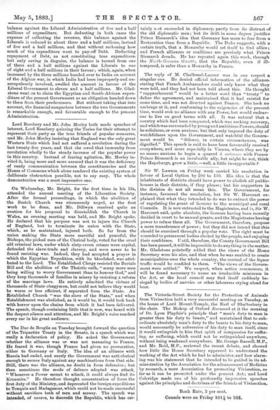Sir W. Lawson on Friday week carried his resolution in
favour of Local Option by 206 to 130. His idea is that the inhabitants of districts should have power to abolish all public- houses in their districts, if they please ; but his supporters in the division do not all mean this. The Government, for instance, favoured the resolution, but Sir W. Harcourt ex- plained that what they intended to do was to entrust the power of regulating the grant of licences to the municipal and rural Councils. It is now entrusted to the Magistrates, and is, Sir W. Harcourt said, quite absolute, the licences having been recently decided in court to be annual grants, and the Magistrates having power to refuse them all. The Government, therefore, propose a mere transference of power ; but they did not intend that this should be exercised through a popular vote. The right must be conceded to permanent bodies elected by the people, and enjoying their confidence. Until, therefore, the County Government Bill has been passed, it will be impossible to do anything in the matter. Mr. Gladstone pointedly added that the views of the Home Secretary were his also, and that when he was enabled to create municipalities over the whole country, the control of the liquor traffic would be confided to them. "The views of the Govern- ment were settled." We suspect, when action commences, it will be found necessary to name an irreducible minimum in the Act, or the local council may find itself suddenly be- sieged by bodies of navvies or other labourers crying aloud for beer.


































 Previous page
Previous page